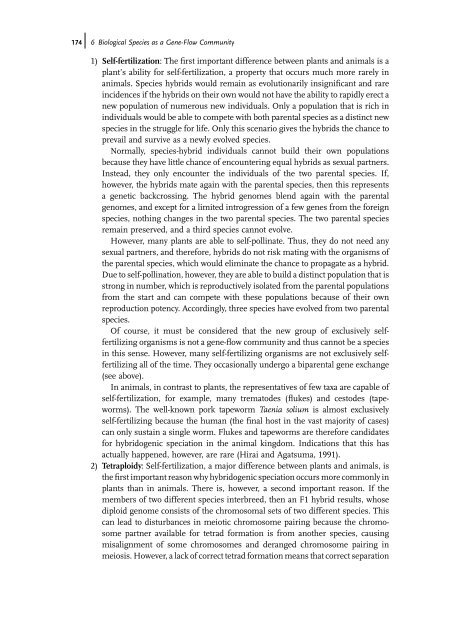Principios de Taxonomia
You also want an ePaper? Increase the reach of your titles
YUMPU automatically turns print PDFs into web optimized ePapers that Google loves.
174j 6 Biological Species as a Gene-Flow Community<br />
1) Self-fertilization: The first important difference between plants and animals is a<br />
plant s ability for self-fertilization, a property that occurs much more rarely in<br />
animals. Species hybrids would remain as evolutionarily insignificant and rare<br />
inci<strong>de</strong>nces if the hybrids on their own would not have the ability to rapidly erect a<br />
new population of numerous new individuals. Only a population that is rich in<br />
individuals would be able to compete with both parental species as a distinct new<br />
species in the struggle for life. Only this scenario gives the hybrids the chance to<br />
prevail and survive as a newly evolved species.<br />
Normally, species-hybrid individuals cannot build their own populations<br />
because they have little chance of encountering equal hybrids as sexual partners.<br />
Instead, they only encounter the individuals of the two parental species. If,<br />
however, the hybrids mate again with the parental species, then this represents<br />
a genetic backcrossing. The hybrid genomes blend again with the parental<br />
genomes, and except for a limited introgression of a few genes from the foreign<br />
species, nothing changes in the two parental species. The two parental species<br />
remain preserved, and a third species cannot evolve.<br />
However, many plants are able to self-pollinate. Thus, they do not need any<br />
sexual partners, and therefore, hybrids do not risk mating with the organisms of<br />
the parental species, which would eliminate the chance to propagate as a hybrid.<br />
Due to self-pollination, however, they are able to build a distinct population that is<br />
strong in number, which is reproductively isolated from the parental populations<br />
from the start and can compete with these populations because of their own<br />
reproduction potency. Accordingly, three species have evolved from two parental<br />
species.<br />
Of course, it must be consi<strong>de</strong>red that the new group of exclusively selffertilizing<br />
organisms is not a gene-flow community and thus cannot be a species<br />
in this sense. However, many self-fertilizing organisms are not exclusively selffertilizing<br />
all of the time. They occasionally un<strong>de</strong>rgo a biparental gene exchange<br />
(see above).<br />
In animals, in contrast to plants, the representatives of few taxa are capable of<br />
self-fertilization, for example, many tremato<strong>de</strong>s (flukes) and cesto<strong>de</strong>s (tapeworms).<br />
The well-known pork tapeworm Taenia solium is almost exclusively<br />
self-fertilizing because the human (the final host in the vast majority of cases)<br />
can only sustain a single worm. Flukes and tapeworms are therefore candidates<br />
for hybridogenic speciation in the animal kingdom. Indications that this has<br />
actually happened, however, are rare (Hirai and Agatsuma, 1991).<br />
2) Tetraploidy: Self-fertilization, a major difference between plants and animals, is<br />
the first important reason why hybridogenic speciation occurs more commonly in<br />
plants than in animals. There is, however, a second important reason. If the<br />
members of two different species interbreed, then an F1 hybrid results, whose<br />
diploid genome consists of the chromosomal sets of two different species. This<br />
can lead to disturbances in meiotic chromosome pairing because the chromosome<br />
partner available for tetrad formation is from another species, causing<br />
misalignment of some chromosomes and <strong>de</strong>ranged chromosome pairing in<br />
meiosis. However, a lack of correct tetrad formation means that correct separation



